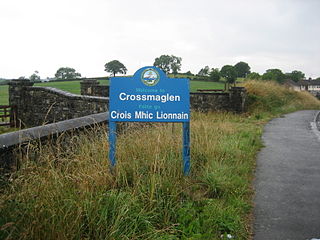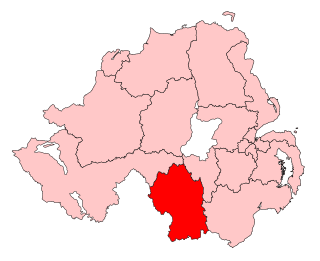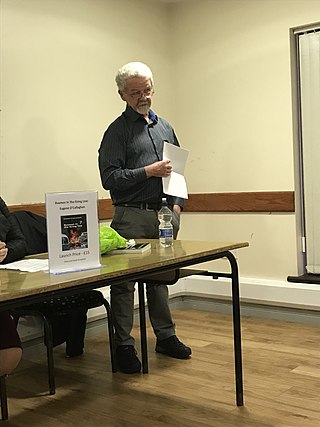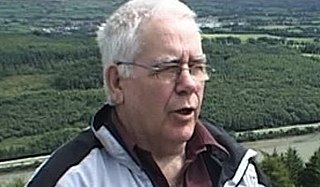Related Research Articles

Newry and Mourne District Council was a local council in Northern Ireland. It merged with Down District Council in May 2015 under local government reorganisation in Northern Ireland to become Newry, Mourne and Down District Council.

Crossmaglen is a village and townland in County Armagh, Northern Ireland. It had a population of 1,610 in the 2011 Census and is the largest village in South Armagh. The village centre is the site of a large Police Service of Northern Ireland base and formerly of an observation tower.

Newry and Armagh is a parliamentary constituency in the United Kingdom House of Commons. The current MP is Dáire Hughes of Sinn Féin who was first elected at the 2024 election.

Tomás Séamus Ó Fiaich, KGCHS was an Irish cardinal of the Catholic Church. He served as the Catholic Primate of All Ireland and Archbishop of Armagh from 1977 until his death. He was created a Cardinal in 1979. Ó Fiaich was born in 1923 in Cullyhanna and raised in Camlough, County Armagh.

Conor Terence Murphy is an Irish republican Sinn Féin politician, who has served as Minister for the Economy of Northern Ireland since 2024. He has been a Member of the Legislative Assembly (MLA) for Newry and Armagh since 2015, having previously served as the Member of Parliament for Newry and Armagh from 2005 to 2015, observing the Sinn Fein policy of abstentionism.

Camlough is a village west of Newry in County Armagh, Northern Ireland. The village is named after a lake, known as the Cam Lough. South of the village is Camlough Mountain, part of the Ring of Gullion and is designated an Area of Outstanding Natural Beauty. Camlough had a population of 1,074 at the 2011 Census.

The South Armagh Brigade of the Provisional Irish Republican Army (IRA) operated during the Troubles in south County Armagh. It was organised into two battalions, one around Jonesborough and another around Crossmaglen. By the 1990s, the South Armagh Brigade was thought to consist of about 40 members, roughly half of them living south of the border. It has allegedly been commanded since the 1970s by Thomas 'Slab' Murphy who is also alleged to be a member of the IRA's Army Council. Compared to other brigades, the South Armagh IRA was seen as an 'independent republic' within the republican movement, retaining a battalion organizational structure and not adopting the cell structure the rest of the IRA was forced to adopt after repeated intelligence failures.
Creggan is a small village, townland and civil parish near Crossmaglen in County Armagh, Northern Ireland. In the 2001 Census it had a population of 246 people. It lies within the Newry and Mourne District Council area.

Cullaville or Culloville (from Irish Baile Mhic Cullach, meaning 'MacCullach's townland' or McCulloch's ville or town is a small village and townland near Crossmaglen in County Armagh, Northern Ireland. It is the southernmost settlement in the county and one of the southernmost in Northern Ireland, straddling the Irish border. In the 2001 Census it had a population of 400 people. The village is on a busy crossroads on the main Dundalk to Castleblaney road ; three of the roads lead across the border and the fourth leads to Crossmaglen.

Lislea is a small village and townland near Slieve Gullion in County Armagh, Northern Ireland. It is within the civil parish of Killevy and the historic barony of Orior Upper. Today it is within the Newry, Mourne and Down District Council area. It borders the townlands of Ballard, Carricnagalliagh, Aghmakane, Duburren and Drumilly. In the 2001 Census it had a population of 84 people.
The Troubles in Cullyhanna recounts incidents during, and the effects of, the Troubles in Cullyhanna, County Armagh, Northern Ireland.

Pat McNamee is an Irish nationalist politician in Northern Ireland who was a Member of the Legislative Assembly (MLA) for Newry and Armagh from 1998 to 2003.

Killeen or Killean is a small village and townland in the civil parish of Killevy, County Armagh, Northern Ireland. It lies about four miles (6.5 km) south of Newry, near the border with County Louth in the Republic of Ireland.

Aughanduff is a small village and townland in the civil parish of Forkhill, in the former barony of Orior Upper, and County of Armagh, Northern Ireland. The townland is roughly co-existent with Upper and Lower Aughanduff Mountains, both of which form part of the Ring of Gullion geological formation, which has been described as the most spectacular example of a ring-dyke intrusion in Ireland or Britain, and was the first ring dyke in the world to be geologically mapped. Aughanduff has been populated since prehistoric times and has been recorded as a distinct district since at least the early 1600s. The area's history is both well documented and reflects its location both in rural Ireland and on the borderlands of the Pale, the Plantation of Ulster, and latterly Northern Ireland; indeed, part of the district's northern boundary was proposed for forming part of the northern border of the Irish Free State by the Irish Boundary Commission in its final report of 1925. The Boundary Commission's report was never implemented and today, the area remains within Northern Ireland, some five miles from the border with the Republic of Ireland. Part of the area has been designated by the Northern Ireland Environment Agency as an Area of Special Scientific Interest, and the district lies within the Ring of Gullion Area of Outstanding Natural Beauty.

The South Armagh Sniper is the generic name given to the members of the Provisional Irish Republican Army's (IRA) South Armagh Brigade who conducted a sniping campaign against the British Army from 1990 to 1997. The campaign is notable for the snipers' use of .50 BMG calibre Barrett M82 and M90 long-range rifles in some of the shootings.

James McAllister, known as Jim McAllister, was an Irish republican activist and former politician from Ireland.
Maria Caraher is an Irish republican activist, school principal and former politician.
Fergal Caraher was a Provisional IRA volunteer and Sinn Féin member who was killed by a group of Royal Marines at a checkpoint in Cullyhanna, County Armagh, Northern Ireland.
On 11 August 1970, two Royal Ulster Constabulary (RUC) officers were killed by a booby-trap bomb planted under a car by the Provisional Irish Republican Army (IRA) near Crossmaglen, in County Armagh, Northern Ireland. They were the first RUC officers to be killed by republicans during the Troubles and the first security forces to be killed in South Armagh, an IRA stronghold for much of the conflict.

The Republican Memorial is a memorial in Crossmaglen, County Armagh, Northern Ireland. The memorial was unveiled in 1979 during The Troubles, as a dedication to the Provisional Irish Republican Army.
References
- ↑ Place Names NI [ permanent dead link ]
- ↑ Lawlor, Pearse. The Outrages: The IRA and the Ulster Special Constabulary in the Border Campaign. Mercier Press, 2011. pp.26-28
- ↑ "Irish Boundary Commission Report". National Archives. 1925. p. 130.
- ↑ Caraher family still seeking justice after 17 years
- ↑ "Volunteer Fergal Caraher". Archived from the original on 16 July 2011. Retrieved 18 September 2019.
- ↑ "Praise heaped on Irish-language nursery school Archived 22 June 2011 at the Wayback Machine ", Newry Democrat , 29 March 2006
- ↑ Harnden, Toby. Bandit Country: the IRA and South Armagh, pg. 86.
